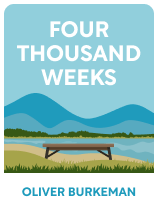

This article is an excerpt from the Shortform book guide to "Four Thousand Weeks" by Oliver Burkeman. Shortform has the world's best summaries and analyses of books you should be reading.
Like this article? Sign up for a free trial here .
Are you looking for Four Thousand Weeks quotes by Oliver Burkeman? What are some of the key passages worth revisiting?
In Four Thousand Weeks, Oliver Burkeman asserts that you and most humans live with the mistaken belief that if you try hard enough and find the right time management solutions, you should be able to gain total control over your time. But according to Burkeman, you’ll never have full control of your time. If you accept this reality—that your time is beyond your control—you’ll be both happier and more productive.
Here’s a selection of passages highlighting some of the key ideas.
Four Thousand Weeks: Time Management for Mortals
In Four Thousand Weeks, Oliver Burkeman argues that the idea that you can wield perfect control over your time is a delusion that only fosters guilt and unhappiness. His solution is for humans to accept that they only have a finite amount of time and to operate within realistic parameters to make their lives as enjoyable and meaningful as possible.
Here is a selection of Four Thousand Weeks quotes by Oliver Burkeman.
“The problem with trying to make time for everything that feels important—or just for enough of what feels important—is that you definitely never will. The reason isn’t that you haven’t yet discovered the right time management tricks or supplied sufficient effort, or that you need to start getting up earlier, or that you’re generally useless. It’s that the underlying assumption is unwarranted: there’s no reason to believe you’ll ever feel ‘on top of things,’ or make time for everything that matters, simply by getting more done.”
Most people rush through life, trying to complete all their to-dos and maximize their productivity because they believe they should be able to “get everything done.” However, Oliver Burkeman argues that the idea that you can wield perfect control over your time is a delusion that only fosters guilt and unhappiness. His solution is for humans to accept that they only have a finite amount of time and to operate within realistic parameters to make their lives as enjoyable and meaningful as possible.
“Where in your life or your work are you currently pursuing comfort, when what’s called for is a little discomfort? Pursuing the life projects that matter to you the most will almost always entail not feeling fully in control of your time, immune to the painful assaults of reality, or confident about the future.“
To work within your time constraints, avoid distracting yourself from high-priority tasks that force you to confront your limitations by developing a tolerance for discomfort, suggests Burkeman. This makes the task less unpleasant and allows you to see it through to completion. For instance, when editing a movie you made (which is important to you), you feel you fell short of achieving your vision. This could cause you to distract yourself from editing by watching TV so you don’t have to confront the limitations of your talent and skill. Instead, if you acclimate to the discomfort of editing your sub-par movie, you can see the task through to the end.
To develop a tolerance for discomfort, Burkeman proposes that when you notice yourself being distracted from an important task, immerse yourself more in it by paying closer attention to it. For example, if you become distracted from the important task of learning how to play the violin, pay even more attention to the details of your practice: Notice how some of the notes sound bad and others good, how your hands feel, and how the bow glides across the strings.
“The harder you struggle to fit everything in, the more of your time you’ll find yourself spending on the least meaningful things. … The reason for this effect is straightforward: the more firmly you believe it ought to be possible to find time for everything, the less pressure you’ll feel to ask whether any given activity is the best use for a portion of your time. Whenever you encounter some potential new item for your to-do list or your social calendar, you’ll be strongly biased in favor of accepting it, because you’ll assume you needn’t sacrifice any other tasks or opportunities in order to make space for it … If you never stop to ask yourself if the sacrifice is worth it, your days will automatically begin to fill not just with more things, but with more trivial or tedious things, because they’ve never had to clear the hurdle of being judged more important than something else.”
According to Burkeman, the more tasks you complete, the more tasks will appear to occupy your newly freed-up time. This is because humans feel they must spend their free time productively. When you have free time, you may decide that a task you might otherwise not deem important is important, because completing it feels like a productive use of your free time. In this way, you fill up your free time with unnecessary tasks.
For instance, if you finish your work for the day and could technically leave the office, you might decide instead that you need to follow up on an email, even though you hadn’t deemed it important before and it doesn’t technically require follow-up.

———End of Preview———
Like what you just read? Read the rest of the world's best book summary and analysis of Oliver Burkeman's "Four Thousand Weeks" at Shortform .
Here's what you'll find in our full Four Thousand Weeks summary :
- Why humans will never have perfect control over how they spend their time
- Why you shouldn't feel guilty when you can't get everything done
- How to best use the finite amount of time you have on Earth






